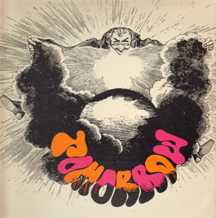Tomorrow (previously known as The In Crowd and before that as Four Plus One) were a 1960’s psychedelic rock, pop and freakbeat band. Despite critical acclaim and support from DJ John Peel who featured them on his “Perfumed Garden” radio show, the band was not a great success in commercial terms. They were among the first psychedelic bands in England along with Pink Floyd and Soft Machine. Tomorrow recorded the first ever John Peel show session on BBC Radio 1 on 21 September 1967. (More from Wikipedia)
Don Arden insisted that the Klubs change their name to Revolution – perhaps he got the idea from another single by Tomorrow called “Revolution” that came out the year before the song of that name, “Revolution” by the Beatles. When the band refused to bow to this demand and arrogantly stood their ground, Arden heaped abuse on the young bandmembers. Don Arden, who was once called “the Al Capone of pop” by critic Johnny Rogan, was not used to taking any lip from the bands that he signed; Arden tore up their recording contract in front of the Klubs and vowed that their Decca recordings would never see the light of day.
(July 2013)
Allmusic states the musical and historical importance of Ptooff! well in their entry by Dave Thompson: “Talk today about Britain’s psychedelic psyxties, and it’s the light whimsy of Syd Barrett’s Pink Floyd, the gentle introspection of the Village Green Kinks, Sgt. Pepper, and ‘My White Bicycle’ [by Tomorrow] which hog the headlines. People have forgotten there was an underbelly as well, a seething mass of discontent and rancor which would eventually produce the likes of Hawkwind, the Pink Fairies, and the Edgar Broughton Band. . . .
“But the deranged psilocybic rewrite of ‘Gloria’ which opens the album, ‘I’m Coming Home’, still sets a frightening scene, a world in which Top 40 pop itself is horribly skewed, and the sound of the Deviants grinding out their misshapen R&B classics is the last sound you will hear. Move on to ‘Garbage’, and though the Deviants’ debt to both period [Frank] Zappa and [the] Fugs is unmistakable, still there’s a purity to the paranoia.
“Ptooff! was conceived at a time when there genuinely was a generation gap, and hippies were a legitimate target for any right-wing bully boy with a policeman’s hat and a truncheon. IT and Oz, the two underground magazines which did most to support the Deviants ([Mick] Farren wrote for both), were both publicly busted during the band’s lifespan, and that fear permeates this disc; fear, and vicious defiance.”
* * *
Also present at the Think Pink sessions was John (Junior) Wood on bass; Wood had been a member of one of the earliest British psychedelic bands, Tomorrow, along with Twink, future Yes guitarist Steve Howe, and Keith West, who appeared in the early rock opera masterminded by Mark Wirtz called A Teenage Opera. West’s single “Excerpt from A Teenage Opera (Grocer Jack)” was an instant hit when it was released in July 1967 and became part of the soundtrack of the Summer of Love.
Standout songs on Think Pink include “Ten Thousand Words in a Cardboard Box”, “The Coming of the Other One” and “The Sparrow Is a Sign”. Dean McFarlane in his Allmusic review also gives Think Pink four stars and writes: “Think Pink is an incredibly varied album with no two songs resembling each other, but then one assumes an acid masterpiece like ‘Ten Thousand Words in a Cardboard Box’ will stay on high rotation for at least a week on the stereos of most psychedelia fans, so overall album flow may not be such an issue. This is pure psychedelic acid rock of the highest order. If one can imagine a fusion of the Incredible String Band, Deviants, early Pink Floyd, and a fair dose of Twink’s heredity as a member of Tomorrow and the Pretty Things, you get an idea of what he was up to. Not known for doing things in halves, he shows little restraint in the assembly of a group designed to tear the roof off the psychedelic scene.”
Many of the songs in the English Freakbeat Series were by musicians that became famous in later bands or in other contexts. For instance, the English Freakbeat, Volume 3 LP includes cuts by the In Crowd, which later became Tomorrow.
(March 2014/2)
* * *
YouTube has several songs by the Klubs. This is the dreamy psychedelic “A” side of their only 45, “I Found the Sun”, and the band would be worth remembering for this song alone: www.youtube.com/watch?v=FlS5vvs-KLE . Another winner, “Can’t Ebenezer See My Mind?” has wyld lyrics in keeping with the title: www.youtube.com/watch?v=rX5UxktFfQ8 . This is the title song “Midnight Love Cycle” from their reissue album whose lyrics recall Tomorrow’s “My White Bicycle”: www.youtube.com/watch?v=_NCBTHxWVWU .
(July 2015)















